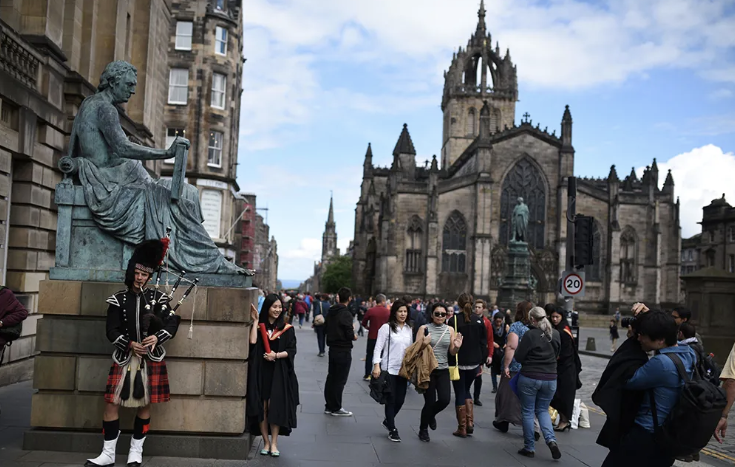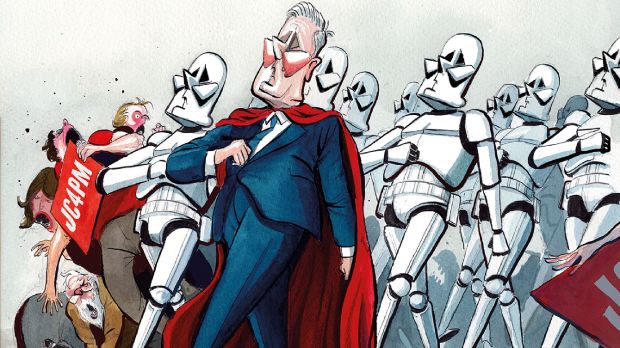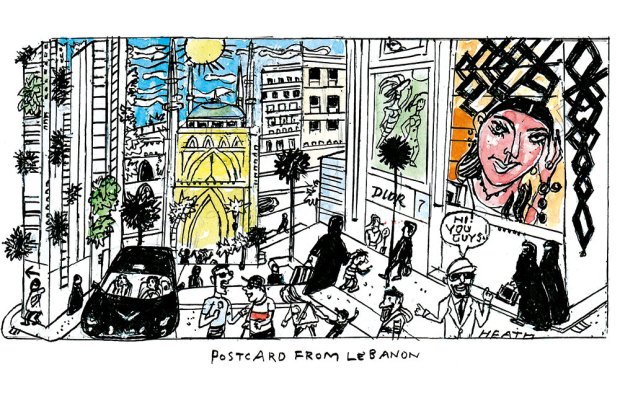It’s not just America that is in the process of rewriting its history and casting itself as patriarchal and oppressive – a similar process is taking place in Scotland. Giants of the Enlightenment such as David Hume are being reimagined as the architects of slavery and the fathers of modern racism.
Scotland’s first black professor, Sir Geoff Palmer, exemplified the new way of thinking in an astonishing talk I heard him give recently at Dundee University. He spoke about the horror of George Floyd’s murder and told the audience that when he watches the footage of the strangulation: ‘All I can see is David Hume.’
The attempt to topple the Scottish Enlightenment began in September 2020 when a group of students demanded that Edinburgh University’s David Hume Tower be renamed. Hume’s crime was to have described black Africans as inferior to white people in a footnote in his 1748 essay Of National Characters. He wrote: ‘I am apt to suspect the Negroes [sic] to be naturally inferior to the whites.’ Despite arguments that this was a misunderstanding or at least a misrepresentation of Hume’s work, the university sided with the student activists and Hume Tower is now 40 George Square.
Two months later, Sir Geoff was appointed as Edinburgh Council’s chair of the Edinburgh Slavery and Colonialism Legacy Review Group and following the findings of this group, a national Museum for Slavery is being considered. Changes to the school curriculum are also being proposed to help focus on slavery, and a plaque has been mounted on the statue of Henry Dundas in Edinburgh claiming that he was responsible for holding back the abolition of slavery.
Several historians have questioned the legitimacy of the claims about Dundas, noting that the history of the late 18th century was far more complex than is being suggested and that holding him responsible for the continued slave trade goes against current academic understanding. However, rather than engaging with these historians and exploring the facts, as an academic should, Sir Geoff Palmer has taken the easier option of labelling them ‘an academic racist gang’.
This isn’t the only bit of suspect thinking from Sir Geoff. In the course of that speech in Dundee University he claimed that there is still an assumption that black people are inferior to whites and that this is a direct consequence of the works of Hume and Immanuel Kant. Unless we teach about slavery properly, Sir Geoff claimed: ‘We are never ever going to get rid of racism because racism is derived from slavery, so people have to know the reason they have these feelings.’
Do the people of Scotland really have ‘these feelings’? Are there many Scots who believe that black people are inferior to whites? If so, I’ve never met them.
Sir Geoff has some peculiar ideas. One of his stated reasons for imagining Scotland to be racist is the ratio of black to white people living there. ‘People have put forward the perception that Scotland is less racist than England or elsewhere,’ he said in an interview with the Herald. ‘I say to them: “Look around. Look at where you work. Do you have a fair representation of the diversity of society? Look where you live.” Because if you don’t have a fair representation, then you better think again.’ It’s hard to make sense of this thought, but Sir Geoff appears to think that unless a vast number of black men and women suddenly choose to relocate to Scotland, it will remain racist.
But then, Sir Geoff is not always consistent. He has said ‘I don’t believe in taking down statues’, and that he simply wants streets, statues and buildings linked to slavery to be marked with signs explaining the past. Yet the renaming of the David Hume Tower was essential, he says, because ‘as long as they say nothing, people are going to continue to believe that negroes are inferior’.
Sir Tom Devine, Professor Emeritus at the University of Edinburgh, pulls no punches when it comes to Sir Geoff’s claims. Sir Geoff has ‘zero scholarly credibility’ to speak about Hume, he tells me. ‘The ridiculous and absurd suggestion that a single footnote from the huge published output of Hume, the world’s preeminent philosopher of the time, encouraged slavery is patent nonsense.’ Sir Geoff himself, it should be noted, is not an academic historian, nor a historian, nor a philosopher. His expertise is in cereal science. Sir Tom, on the other hand, has edited a collection of essays about Scotland’s historic involvement in the slave plantations: Recovering Scotland’s Slavery Past.
As with similar projects in America, there is an attempt in Scotland to discredit even those Scottish Enlightenment figures who opposed slavery. No white man can be given credit. But in the process of amplifying white guilt, many of the vital gains of the Enlightenment – gains that Hume embodied – are actually in danger of being lost. The Enlightenment, despite its contradictions and limitations, helped to transform and modernise the world and gave us the tools with which to celebrate and fight for human equality. It developed an academic and intellectual legacy that helped to challenge narrow, parochial and moralistic outlooks in society. Debate, scepticism, an examination of the facts and a questioning attitude to life were encouraged. In today’s arguments about Scottish colonialism and slavery, these enlightened attributes are being lost, which in the end will do the most harm to the very people that Sir Geoff claims to champion.
Discussing the renaming of the Hume Tower, Edinburgh’s Professor Jonathan Hearn says: ‘I was left with the overwhelming feeling that the question of the building’s name has nothing to do with Hume, and that Hume was only standing in as a symbol of something else – a rather vague conceivable notion of the oppressiveness of western Enlightenment thought.’ Perhaps due to the backlash, the university’s principal, Professor Peter Mathieson, has now apologised for the confusion, and suggested the Tower’s name could be changed back. This, at least, would be one small victory.
The post The attempt to topple the Scottish Enlightenment appeared first on The Spectator.
Got something to add? Join the discussion and comment below.
Get 10 issues for just $10
Subscribe to The Spectator Australia today for the next 10 magazine issues, plus full online access, for just $10.
You might disagree with half of it, but you’ll enjoy reading all of it. Try your first month for free, then just $2 a week for the remainder of your first year.














Comments
Don't miss out
Join the conversation with other Spectator Australia readers. Subscribe to leave a comment.
SUBSCRIBEAlready a subscriber? Log in